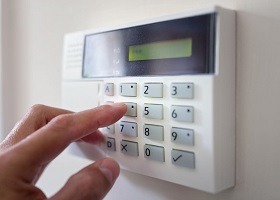
An effective alarm system is a key component in any home security set up, as it deters unauthorised intrusion into a residential or commercial area and is a proven method for crime prevention.
Basically, the system is composed of interlinked devices that send out visual and/or sound alert signals whenever a security threat is detected. There are different types of alarm systems for homes and businesses, including those that are used for burglary, fire, and other emergency situations.
A good system is one that actually works when a real security threat exists and doesn’t need frequent repairs and one that does not send out alert signals when there is no real threat. Because alarm systems use resources such as electricity, they should be installed in a way that will completely prevent the occurrence of two costly scenarios: a false negative and a false positive.
False negatives are cases wherein a system fails to send off the alerting signals when actual security threats—such as an unauthorized intrusion into the security premises—do happen.
In other words, the alerting mechanism is not triggered even when a real threat is occurring. In most cases this means that either the sensors or the communication relays are malfunctioning. On the other hand, the opposite scenario—called false positive—is also known to occur.
False positives are cases wherein the system triggers an alert signal even when there are no signs of a security threat. False positives can be very costly, especially when the system is an advanced, sophisticated version that integrates the police and other law enforcing agencies in the security protocol. Imagine the costs when a false alarm is triggered and a police unit is summoned to the secured area. Fuel and manpower hours are spent needlessly and might mean compromising the containment of real crimes that occur simultaneously with the false positive.
Home and business owners should invest in a reliable security alarm system, not only because they have been demonstrated to act as an effective crime deterrent, but also because they offer relative peace of mind. However, business and homeowners still need to do some research or consult security experts on which alarm systems are most suitable for their premises, location, and budget.
After all, there are a number of different types of security mechanisms, ranging from simple devices that can be readily installed at home and purchased cheaply from hardware stores to sophisticated systems that are interfaced with command centres that are staffed 24/7 with trained security personnel. With the latter, any threat will be dealt with quickly and systematically, usually following protocols based on priority or threat levels. With the former, alert signals—such as blazing lights and loud sirens—are often sufficient to discourage burglars and other intruders from continuing to participate in any criminal activity on the premises.
Allocating sufficient time to determine the best security system to install will help the business or homeowners to maximize their budget, secure their premises, and allow them to shift focus from security concerns to their core business or personal pursuits.
Homeowners also have the option of having their residential premises placed under a monitored security system 24 hours a day. This means that trained security personnel in a central monitoring station place a residential building under close watch. Commonly, this advanced system entails a periodic service fee. For the budget-challenged, one of the best alternatives is to integrate a dialler or any other communication device that is designed to alert preselected numbers—such as the owner’s mobile phone, the police station, or a private security provider—whenever a security breach is experienced.











